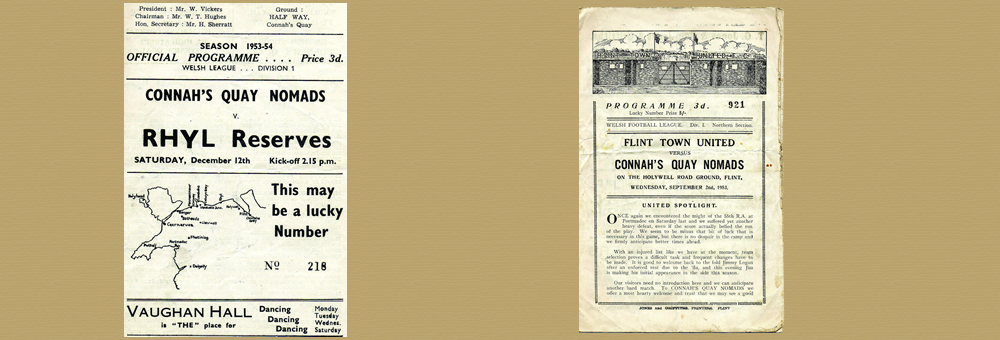
We now move on to examine the Club's overall performance during the first seven
years of participation in the Welsh League (North). Before doing so, however, it is appropriate to recall the honours gained by Nomads' players during the 1952/53 campaign.
For example, Albert Davies became the club's first amateur international with appearances for Wales against England at Arsenal's Highbury Stadium and against Scotland at Wrexham. John Parry added to his schoolboy honours with a Welsh Youth cap against England and he also represented the North Wales Coast F.A. in the annual fixture with a Scottish XI. That match was staged at Hibernian's Easter Road ground in March 1953 when Parry opposed an 18 year-old Newtongrange Star wing-half by the name of Dave Mackay. The strong-tackling Mackay was to become a legendary Scottish footballer making over 600 appearances for Heart of Midlothian, Tottenham Hotspur, Derby County and Swindon Town.
Parry was due to sign as a full-time professional with Aston Villa but in that game he suffered a broken leg which ruined his footballing career. Nomads' goalkeeper Ron Lammond was given a trial for the Welsh Amateur team as was Billy Davies, Albert's brother.
Eric Smith had been the club's secretary for a couple of years when he was forced to step aside owing to pressure from a very strong committee. The players all liked Smith very much. After all, he had been a part of the Club since it's formation in 1946 but the committee found him something of a 'rough diamond'. Instead the post of secretary went to Henry Sherratt a former centre-half with Flint Town United and the Silkmen's secretary prior to his appointment at the
Halfway Ground.
Sherratt's football background was first class but the players simply didn't take to him. One by one the Nomads team of 1952/53 began to break up. Peter Williams signed as a professional with Aston Villa, Harry Smith joined Chester and went on to make more than 70 appearances in the Football League, Eric Evans was called
up to do his National Service in the Army and 'keeper Ron Lammond in the R.A.F.
Early season results were poor and after just six weeks of the 1953/54 season the Davies brothers were transferred to Flint Town United and Don Owen soon followed them. The Silkmen also made an approach to Geoff Thelwell but he remained true to the Nomads despite his dismay at the way the successful team from 1952/53 was being broken up. Sherratt brought in several new players but it was
clear they were not up to the standard required. On 12th December 1953 Nomads entertained Rhyl Reserves whose senior team was opposing Bristol City in the second round of the F.A. Cup at Belle Vue that same afternoon. A glance at the league table in that afternoon's match programme highlighted Nomads' plight.
Sixteen Welsh League games had produced just two victories and a solitary draw and only Bethesda Athletic stood between the Nomads and the bottom of the league.
Matters went from bad to worse and as Christmas approached so Blaenau Ffestiniog visited the Halfway and hammered the Quay 7-1. Fortunately an upturn in results
for the second half of the season saw Nomads climb two places to finish 15th after winning seven of their last 18 games.
While the descent from glory to mediocrity was hard to swallow for Nomads' loyal supporters, just along the road Flint Town United - with a number of former Nomads players in their team - were having a marvellous time. Flint were on the crest of a wave in the Welsh Senior Cup and Connah's Quay, already dumped out of the competition by Wrexham, could only stand and watch as the Silkmen marched into the last eight of the cup.
Crowds flocked to Holywell Road for the quarter-final tie in which Llanelly were defeated 2-1 in atrocious weather. Former Nomad Billy Davies, who had scored both goals to defeat Rhyl in the previous round, bagged another to equalise against the South Walians and Whelan notched the winner. Semi-final opponents Cardiff City fielded their First Division team which included three full Welsh Internationals but Flint won 2-1 and went on to beat Chester in the Welsh Cup
final by the same score.
The 1954/55 season couldn't come quickly enough for Connah's Quay if only to put the events of the previous campaign behind them. As it transpired this proved to be the only year in which league victories outnumbered defeats although more than a century of goals were recorded in the 'goals against' column for the third consecutive season despite a final placing of ninth which was never bettered in those first seven years in the Welsh League.
The club's topsy-turvy existence continued as only eight matches were won in 1955/56 and 119 goals shipped by a leaky defence yet the following campaign was one of stability and the only one in which the team scored more goals (94) than conceded (84). By now Harry Sherratt had left the Club and stalwart Geoff Thelwell returned as both secretary and player following brief spells with Colwyn Bay and Holywell Town. Geoff set out to rid the club of its debts whilst striving to keep the team playing at the highest level possible in North Wales. This he managed until club officials resolved to withdraw from the Welsh League in 1959.